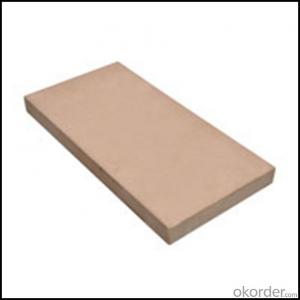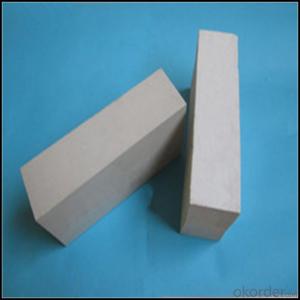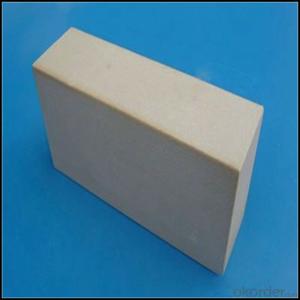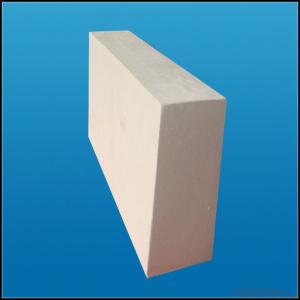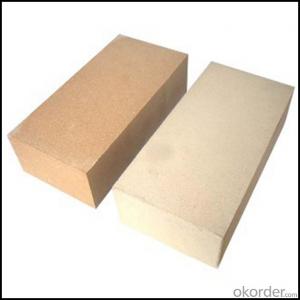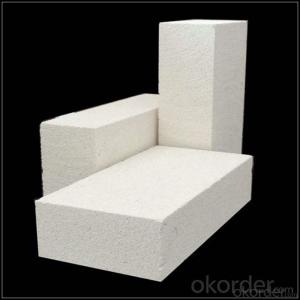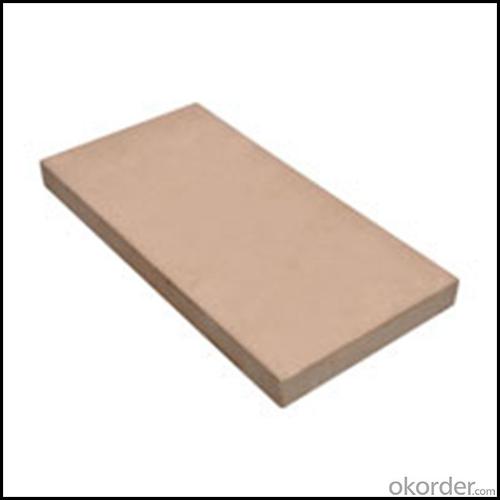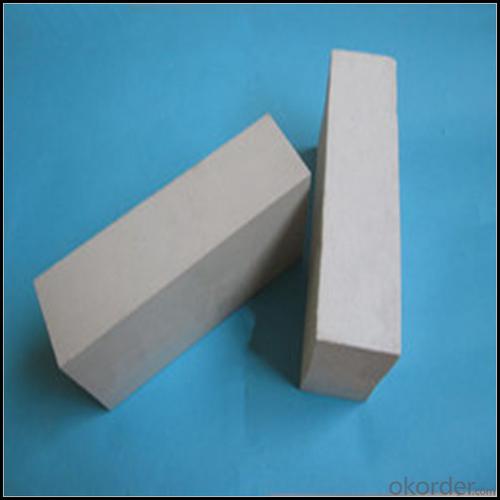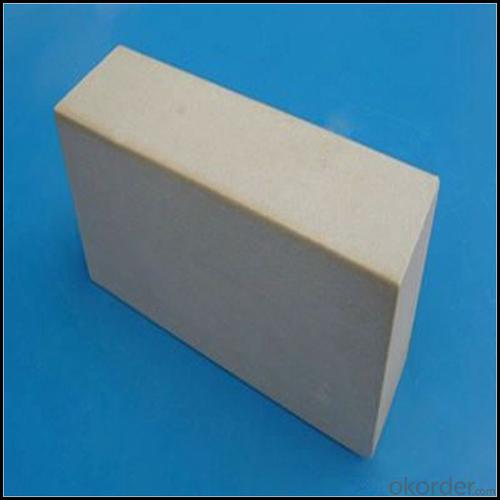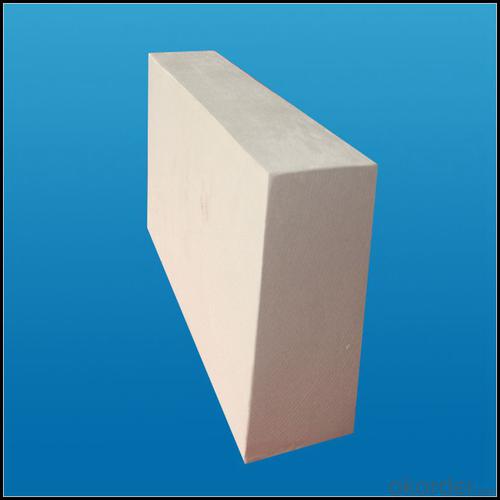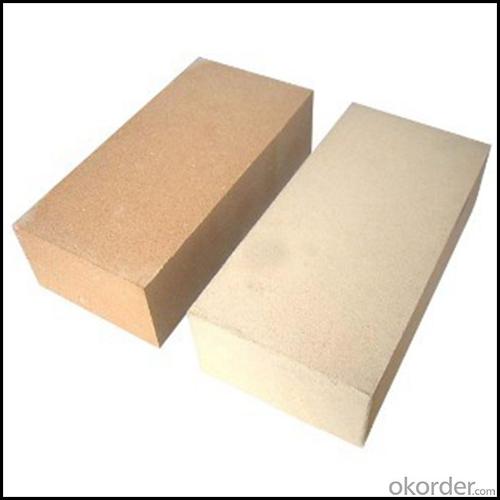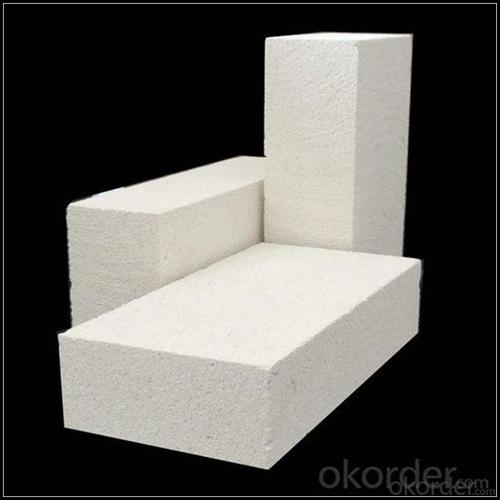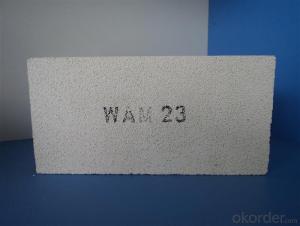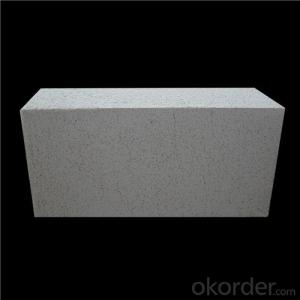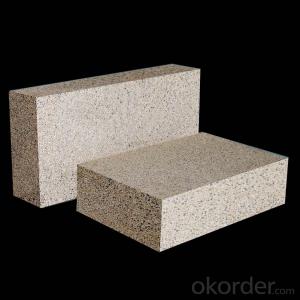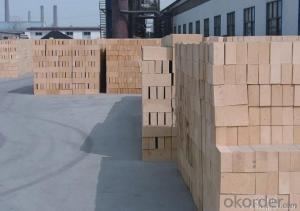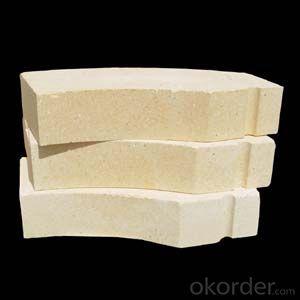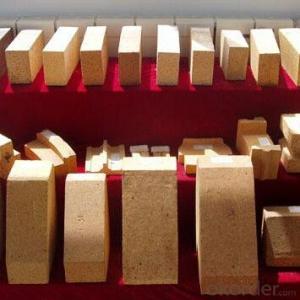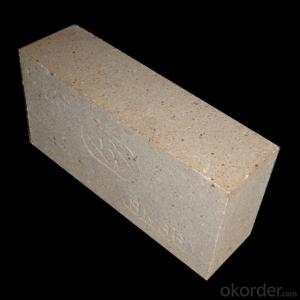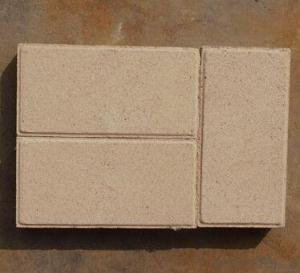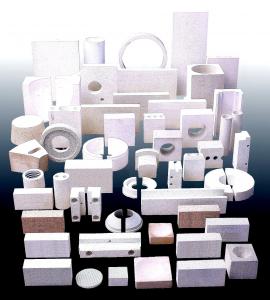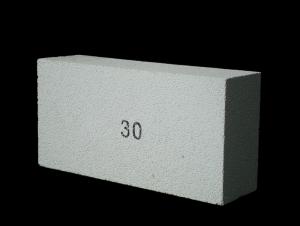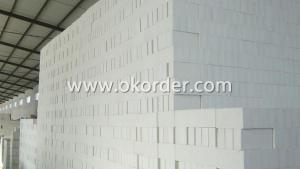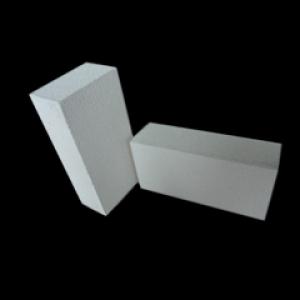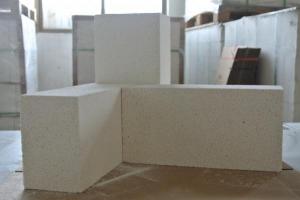High Alumina Insulating Fire Bricks - Fireclay Refractory Bricks
- Loading Port:
- China main port
- Payment Terms:
- TT OR LC
- Min Order Qty:
- 1 m.t
- Supply Capability:
- 2500 m.t/month
OKorder Service Pledge
OKorder Financial Service
You Might Also Like
Acid Resistant Brick
CMAX firebricks are classified under temperature between 1300℃ to 1700℃, manufactured from high purity alumina clay.
High alumina refractory brick is dense shaped refractory material. With high refractoriness and mechanical behavior under high temperature, refractory brick is the necessary material of high-temperature services, mainly used for industrial furnaces and kilns and thermal equipment.
High alumina refractory brick has wide applications, mainly used in metallurgy, construction(cement and glass), petroleum, chemical industry, electric power and machine building.
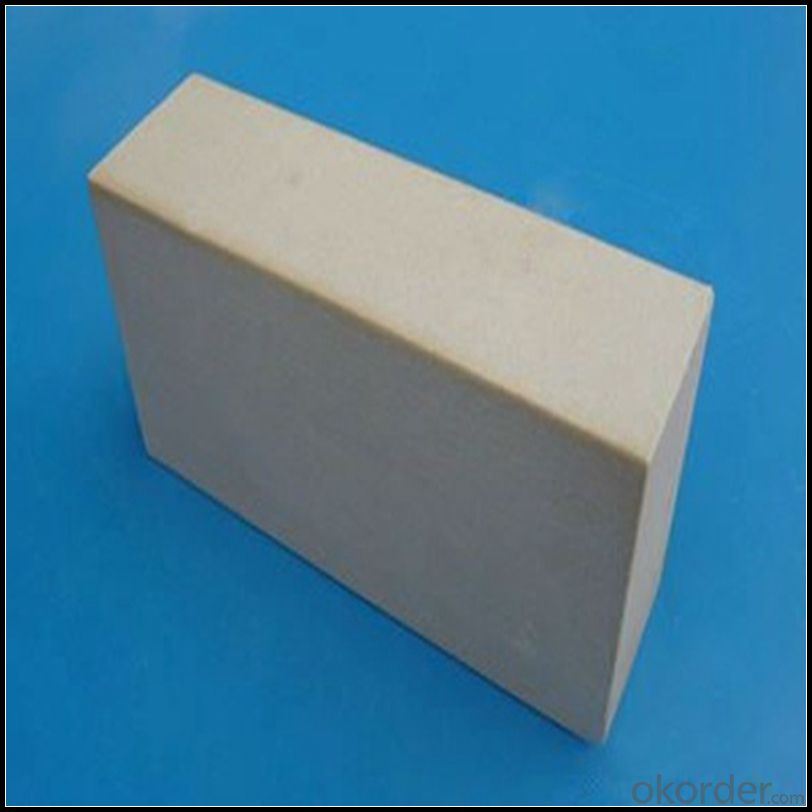
Features
Certificate of Quality for each parcel
Raw material from China, Australia and Germany
Good price
Many sizes in stock ; Making tiles accroding to your drawings
Resistance: Excellent
Quick delivery& Professional service
Excellent thermal stability
High refractoriness under load
Excellent thermal shock resistance
High refractoriness
High strength
Low thermal conductivity
Slag resistance to acid and alkaline slag erosion
Application
Data Sheet
Classification Temperature (℉/℃) | 3000/1650 |
Bulk Density (g/cm3 ) | ≤1.0 |
Thermal Conductivity | |
800℃, W/m.K | ≤0.39 |
1000℃, W/m.K | ≤0.43 |
1200℃, W/m.K | ≤0.48 |
Reheating Linear Change (%) | 1550℃×12h |
≤0.9 | |
Chemical Composition (%) | |
Al2O3 | ≥75 |
Fe2O3 | ≤0.5 |
Packaging & Shipping
Packaging Details:Be packed in fumigated wooden pallets
Delivery Detail: 30 days after order

Our Services
Optimum solution and product supply of refractories for high temperature industries, such as iron steel, non-ferrous, petrochemical and building materials.
Engineering design, contract and consult for refractories, and civil architecture design.
Research, development, manufacture and sale of superhard materials.
R&D, manufacture and sale of special packing materials for export.
Inspection, supervision and arbitration of refractories.
Consultation and services in refractories information.
Training and cultivation of high-level talents in refractories profession
Sales Network

Company Information
CNBM (China National Building Material) Group is the largest comprehensive building materials group in China that in integrate scientific research, manufacturing and logistics into one entity. The largest building materials and equipment specialists in China. Upon State Council approval, today CNBM owned more than 300 subordinate manufacturing factories and servicing companies. There are 6 fully owned public listed companies and 11 partially owned with substantial shares public listed companies. In many of these fields, CNBM is playing the leading role in the building industry in the country.
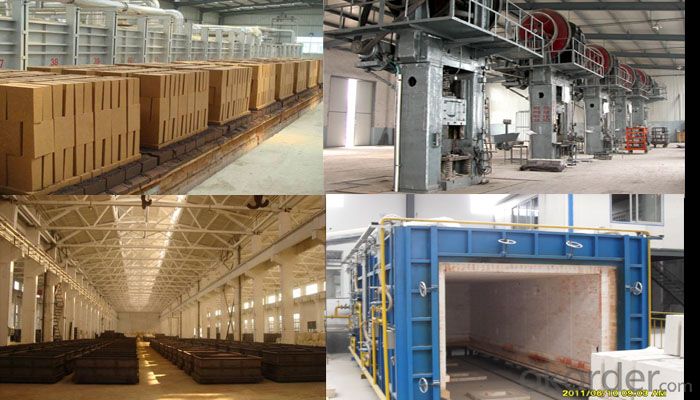
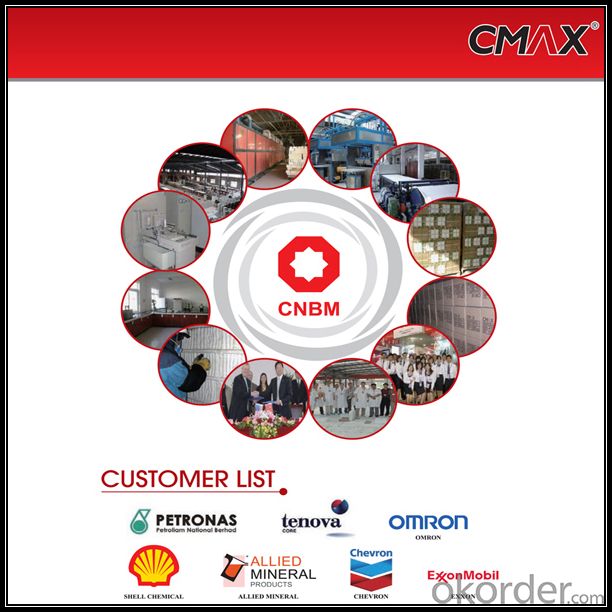
FAQ
1. Which products do you have?
We have all kinds of refractory brick, castable, mortar, cement, ceramic fiber products, etc.
Or you could browse our products to choose what you need.
2. Can you give me a brief introduction of the application of your products?
We are mainly specializing in the refractory materials in iron and steel, cement, glass, ceramics, petrochemical, electric power Industry, etc.
3. If I need your offer, what information do you need?
In order to choose suitable products, it will be appreciated to provide us the information, such us specification, technical data, order quantity, products application etc. If any question, please contact us freely.
- Q: Do insulating fire bricks require any special fireproof gaskets or seals?
- No, insulating fire bricks do not require any special fireproof gaskets or seals. They are designed to provide excellent insulation and can be stacked or mortared together without the need for additional seals or gaskets.
- Q: Can insulating fire bricks be used in the construction of glassware production furnaces?
- Yes, insulating fire bricks can be used in the construction of glassware production furnaces. These bricks have excellent thermal insulation properties and can withstand high temperatures, making them ideal for creating a well-insulated and efficient furnace for glass production.
- Q: Can insulating fire bricks be used in the construction of glassware production furnaces?
- Insulating fire bricks are capable of being used in the construction of furnaces for glassware production. These fire bricks are specially designed to possess low thermal conductivity, enabling them to tolerate extreme temperatures while effectively providing insulation. This quality makes them highly suitable for deployment in furnaces dedicated to glassware production, as they aid in heat retention and minimize energy wastage. Moreover, these fire bricks exhibit resistance to thermal shock, which is vital in glassware production where sudden temperature fluctuations can arise. In summary, the incorporation of insulating fire bricks in the construction of furnaces for glassware production ensures the equipment operates efficiently and safely.
- Q: Can insulating fire bricks be used in kiln car construction?
- Yes, insulating fire bricks can be used in kiln car construction. Insulating fire bricks are made from lightweight materials that have excellent insulating properties, such as ceramic fibers or lightweight refractory aggregates. These bricks have low thermal conductivity, which means they can effectively retain heat and prevent heat transfer to the outer surface of the kiln car. Using insulating fire bricks in kiln car construction offers several benefits. Firstly, it helps to reduce heat loss, which improves energy efficiency and lowers fuel consumption. This is particularly important in high-temperature applications like kilns, where maintaining a consistent temperature is crucial. Secondly, insulating fire bricks can help to protect the kiln car from thermal stresses and cracking. Kilns undergo significant temperature changes during firing cycles, and the use of insulating fire bricks can help to minimize thermal shock and extend the lifespan of the kiln car. Furthermore, insulating fire bricks are lightweight compared to traditional refractory bricks, making them easier to handle and install in kiln car construction. This can lead to cost savings in terms of labor and transportation. However, it's important to note that insulating fire bricks have lower strength and durability compared to dense refractory bricks. Therefore, they are typically used in the hot face lining of kilns, while a more robust material is used for the kiln car structure. In conclusion, insulating fire bricks can be effectively used in kiln car construction to improve energy efficiency, protect against thermal stresses, and enhance the overall performance of the kiln.
- Q: Do insulating fire bricks require any special firebrick mortar for installation?
- Yes, insulating fire bricks do require a special firebrick mortar for installation. These bricks have a lower density and higher insulating properties, so using a regular mortar can compromise their performance. It is recommended to use a specialized firebrick mortar that can withstand high temperatures and bond effectively with the insulating fire bricks to ensure a proper and durable installation.
- Q: Can insulating fire bricks be installed in both industrial and residential settings?
- Insulating fire bricks can be utilized in both industrial and residential environments. These bricks are specifically engineered to endure extreme temperatures and offer superb insulation, rendering them appropriate for various purposes. In industrial settings, insulating fire bricks are frequently employed in furnaces, kilns, and ovens, as they aid in conserving energy and ensuring stable temperatures. In residential settings, they can be employed in fireplaces, wood-burning stoves, and pizza ovens, enhancing heat retention and promoting safety. Due to their versatility and durability, insulating fire bricks are a dependable option for installations in both industrial and residential settings.
- Q: Are insulating fire bricks resistant to fire?
- Yes, insulating fire bricks are specifically designed to be highly resistant to fire. They have excellent insulating properties and can withstand high temperatures without cracking or breaking down.
- Q: Are insulating fire bricks suitable for use in lime kilns?
- Yes, insulating fire bricks are suitable for use in lime kilns. They have high insulating properties that help to maintain high temperatures inside the kiln while minimizing heat loss. This is important for efficient lime production. Additionally, insulating fire bricks are resistant to the corrosive nature of lime, making them a durable and reliable choice for lime kilns.
- Q: Can insulating fire bricks be used in refractory coatings?
- Indeed, refractory coatings can indeed utilize insulating fire bricks. The primary purpose of insulating fire bricks is to possess a low level of thermal conductivity, rendering them highly effective for insulation purposes. By incorporating insulating fire bricks into refractory coatings, the potential for heat loss is minimized, thereby enhancing energy efficiency. Moreover, these bricks have the capacity to withstand exceedingly high temperatures, making them ideal for refractory coatings that are subjected to extreme heat. However, it is crucial to thoroughly assess the specific requirements and characteristics of the refractory coating, as well as the intended application, to ascertain that insulating fire bricks are the most appropriate selection.
- Q: What bricks are thermal insulation bricks?
- First, replace the aluminum plate, honeycomb board, curtain wall and other common decorative materials, multi-functional integration, a construction can solve the two requirements of thermal insulation decoration, smooth, smooth and beautiful, decorative strong.Two, high strength, good rigidity, light quality, seismic resistance, wind resistance, creep resistance, superior performance, reduce building load, more economical and durable.Three, fire retardant, heat preservation, energy saving, sound insulation, heat insulation, crack resistance, waterproof, according to the 65% building energy conservation requirements for construction design.Four. The installation of the finished product is simple, the process is simplified, the construction period is shortened, and the quality is easy to control.Five, no aluminum, steel, keel support, embedded in the installation, reduce the insulation board and the gap between the wall. Increased safety system.Six, no radiation, green environmental protection, can be widely used in various types of public buildings and family interior decoration.
Send your message to us
High Alumina Insulating Fire Bricks - Fireclay Refractory Bricks
- Loading Port:
- China main port
- Payment Terms:
- TT OR LC
- Min Order Qty:
- 1 m.t
- Supply Capability:
- 2500 m.t/month
OKorder Service Pledge
OKorder Financial Service
Similar products
Hot products
Hot Searches
Related keywords
